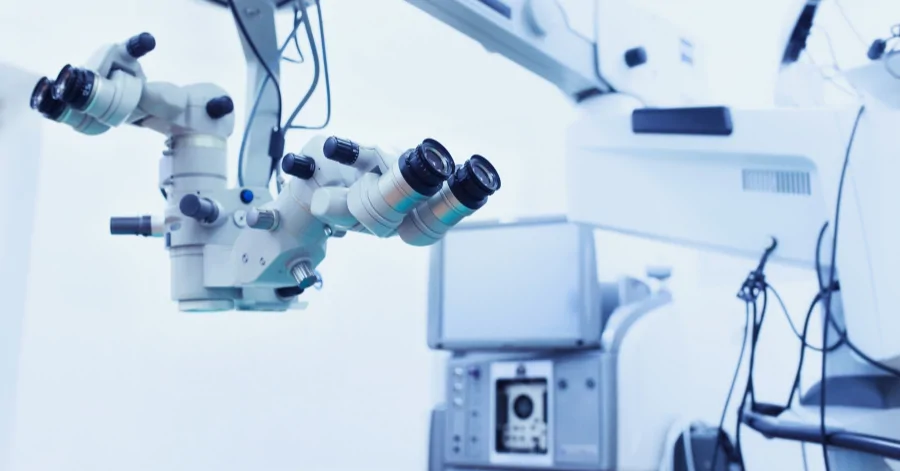The global life sciences supply chain has come under increasing pressure over the first few years of the 2020s. This is not only as a result of the lockdowns and social distancing measures imposed across the globe during the COVID-19 pandemic but also due to rising costs, material shortages, geopolitical instability, and ecological changes, disrupting the entire life science logistics and manufacturing process for biotechs, pharmaceutical firms, CROs, and CDMOs.
Furthermore, changing market forces—such as increased security regulations, industry mandates, and shifting customer demands—have meant that businesses have had to become more adaptable, agile, and resilient to ensure competitiveness in 2023.
It’s clear a new model is required to accommodate these inevitable disruptions to the life sciences supply chain, especially as advancements in medtech, pharmaceutical therapies, and cell and gene therapies (CGT) require a life science logistics process which is more intricate than ever before.
This article explores some of the emerging technologies that are helping market-leading organisations to reshape their life sciences manufacturing and logistics processes, face pharma supply chain challenges in innovative ways, or have greater visibility of the location of their goods and materials. These technological advances are helping to mitigate the impact of supply chain disruption within the life sciences, empowering companies to create robust, reliable, and effective medicines and devices that progress lives everywhere.
5 Emerging Technologies Reshaping the Life Sciences Supply Chain
Life sciences manufacturing ranks amongst the most affected sectors when it comes to the havoc caused by supply chain disruptions. Pharma supply chain challenges such as cold storage and the speedy delivery of active pharmaceutical ingredients (APIs)—of which 40% are manufactured within China—do not lend themselves well to these broken or bent supply chains. Due to this, industry leaders are now looking at how to adapt to this new reality and discover the potential it holds for their businesses.
To deal with life sciences supply chain disruptions, many organisations exchange efficiency for greater resilience, whilst others prioritise costlier suppliers in more stable markets to respond to the volatility of international relations. These strategies come at a cost, but businesses are working to mitigate this additional expenditure through investments which allow them to leverage emerging technologies.
But what are these emerging technologies, and in what ways are they helping to address biotech, medtech, and pharma supply chain challenges, as well as broader disruptions to the global life sciences supply chain?
1. Blockchain
By utilising increasingly-popular blockchain technologies, life sciences manufacturing organisations are able to incorporate transparency and traceability into every part of the supply chain. Allowing companies to log data and transactions in a tamper-proof, counterfeit-proof manner, blockchain technologies are helping organisations to monitor each step of the life science logistics process.
This enhancement of life sciences supply chain visibility is crucial when it comes to businesses being able to remain resilient and comply with national and international regulations on pharmaceutical or medical products and devices. Indeed, organisations are quickly realising this potential, with the value for life sciences blockchain technology alone presenting $3bn in investment opportunities by 2025.
The supply chain within life sciences manufacturing is becoming ever more complex due to the number of specialised stakeholders such as research and development organisations, distributors, logistics providers, and healthcare organisations involved. Blockchain technologies make certain that all participants have access to the same verified and synchronised information, reducing errors and the likelihood of tampering whilst allowing business leaders to identify inefficiencies at points in the process, which can then be resolved.
Of all the solutions that can be employed to mitigate biotech and pharma supply chain challenges, increasing visibility through the utilisation of the blockchain or smart contractors is by far the most impactful. It enables life science organisations to create more effective transportation management, anticipating disruptions before they occur. Moreover, the cost-effectiveness and reliability of supply chains become apparent when faced with this increased visibility.
2.Internet of Things (IoT)
With an increasing amount of devices and manufacturing equipment able to join the network of interconnected devices known as the Internet of Things (IoT), life science logistics and manufacturing organisations are in a position to collect, monitor, and transmit real-time data throughout the supply chain, helping to keep all key stakeholders abreast of the latest information on their materials and goods.
IoT sensors in warehouses, transportation vehicles, and storage facilities help to ensure that goods which require temperature control, for instance, are kept in cold storage throughout the course of their journey. This technology was employed by life science distributors over the course of the pandemic to transport the Pfizer/BioNTech COVID-19 vaccine at temperatures no greater than -60°C, helping to cut the number of damaged or lost medicines to 0.1%.
These advancements in IoT technologies mean that the dual pharma supply chain challenges of maintaining high quality and ensuring regulatory compliance can be met head-on. When businesses are able to monitor the environmental conditions in which their products or materials are being housed in real-time, they can proactively react to adjust storage conditions remotely or initiate corrective measures before product quality is compromised.
Alongside this, sensors are able to aid in predictive maintenance within the advanced engineering environment, highlighting when the condition or performance of certain mechanical or technological aspects of the life sciences supply chain drop below a certain value before failure occurs, reducing downtime and optimising efficiency.

3. Artificial Intelligence and Machine Learning (AIML)
Artificial intelligence and machine learning (AIML) technologies present global supply chain management professionals within the life sciences with the opportunity to revolutionise their working practices and overall efficiency.
AIML algorithms can be used to analyse vast data sets, enabling global supply chain management experts to better predict demand and optimise sourcing and distribution strategies, forecasting required inventory levels and ensuring the right materials are available when required.
At the same time, AI technologies such as Robotic Process Automation (RPA) are helping to automate manual, repetitive tasks that take up critical time within the life sciences supply chain. Organisations utilising these technologies report that they’ve experienced reduced errors, increased speed, and the freeing up of their personnel to focus on more strategic duties.
As highlighted in a techUK report, AIML technologies are not only disrupting the life sciences manufacturing and logistics processes but are presenting benefits across the entire product lifecycle, from drug development and R&D to clinical trials. The market for these groundbreaking technologies is anticipated to grow exponentially, with a global market value of $45bn by 2026.
These AIML technologies allow organisations to manage their life science logistics and supply chain risks in an enhanced, data-driven way, enabling them to act proactively—rather than reactively—to disruptions.

4. Digital Twins
Digital twins—virtual copies of physical products, materials or processes—are offering organisations the opportunity to enhance the resilience of the life sciences supply chain.
Businesses can create virtual models of their entire supply chain through the use of digital twins, which allow them to model the behaviour of these products throughout the manufacturing and logistics lifecycle, allowing global supply chain management experts to simulate “what-if” scenarios, testing and optimising their processes without disrupting their actual, physical products and materials.
Much like the other technologies on this list, by increasing supply chain visibility, digital twins offer organisations the opportunity to analyse the performance of their processes in real-time, providing insights into performance patterns, identifying failure points, and mitigating risks in a predictive—rather than reactive—fashion. This can help in developing contingency plans and facilitate rapid response in case of real-world disruptions.
Similar to the impact that the DevOps methodology has had on software development, digital twins offer global supply chain management professionals the ability to test and integrate continuous improvements into the life sciences supply chain, helping organisations to innovate and adapt to market demand.
5. Cloud Computing
Cloud computing presents the life sciences supply chain with an opportunity to mitigate or outright avoid disruption.
A scalable option, unlike the other entries on this list, cloud computing presents an affordable way for smaller organisations to ensure that their digital operations can be scaled depending on the market or seasonal demands, ensuring that they can handle peaks and weather troughs without the need for significant investment in infrastructure.
Cloud platforms present life science logistics providers, manufacturers, and product researchers and developers alike to share information seamlessly, inspiring a culture of collaboration and accountability within the life sciences supply chain. Biotech organisations can share critical information with their distributors or healthcare professionals, and manufacturers can share real-time updates on active pharmaceutical ingredients, helping to enhance the efficiency of the entire supply chain.
Moreover, cloud computing providers such as Amazon, Microsoft, and Google all invest heavily in security measures, giving global supply chain management professionals the confidence that their business-critical data is secure and protected from unauthorised access. These cloud providers are also regularly audited to ensure they comply with standards set out in legislation such as HIPAA and GDPR.
As more companies are exploring options to minimise losses, the adoption rate of these technologies has accelerated in recent years. Life sciences supply chain organisations are increasingly able to predict and adapt to disruptions, and the end-to-end automation of the supply chain planning process allows companies to stay agile and react quickly.
Whilst the adoption rate of these new technologies is still low in some cases, as can be seen by their anticipated market values, this is likely to change over the course of the 2020s. This means that if business leaders within the life sciences want to remain competitive, they need to be certain that they can connect with the right talent.
Sourcing Professionals for Global Supply Chain Management
To properly utilise these new technologies, companies need knowledgeable professionals who can implement them into the life sciences supply chain with minimal disruption to the regular flow of goods and materials. These global supply chain management experts are in high demand but low in supply, making it difficult to find talent with the appropriate skills.
Companies that are succeeding in attracting new talent are moving quickly, closing gaps in their life science logistics processes and cutting down on inefficiencies. At the same time, there are inefficiencies within traditional hiring practices that can present a stumbling block for organisations looking to quickly onboard and get their talent up to speed, especially within fast-paced manufacturing and research and development environments.
This is why it’s important to connect with a specialist that understands what experts in OPEX/CAPEX, demand planning and forecasting, and continuous improvement require. Many of these global supply chain management experts are already at the apex of their respective careers, working for market-leading organisations—and are therefore unlikely to be swayed into a new position without research into the things they expect from an employment offer: competitive salaries, benefits, and flexible arrangements which prioritise work-life balance.
With the life sciences supply chain moving as fast as the speed of business—which is to say rapidly—many organisations simply can’t devote the time necessary to entice these passive, highly-skilled industry experts.
On the other hand, a specialist in recruiting for supply chain roles within the life sciences will have spent their careers developing a robust method for screening, assessing, interviewing, and placing candidates, ensuring that business leaders have the confidence that their supply chain operations are being managed by diligent and passionate experts.
If you’re still interested in the ways that these disruptions are impacting manufacturing and logistics within the life sciences supply chain and beyond after reading this article, see our guide on the impact of lasting disruptions on supply chains for a closer look at the effects these have on companies and consumers.
The Verdict
The global life sciences supply chain has faced numerous challenges and disruptions over recent years. This has necessitated the adoption of emerging technologies such as blockchain, the internet of things, artificial intelligence, digital twins, and cloud computing, which have proven to be effective in reshaping the manufacturing and logistics process.
These technologies enhance visibility, improve efficiency, and enable proactive measures to mitigate supply chain disruptions. By incorporating these advancements, organisations can create robust and reliable supply chains, ensuring the distribution of effective medicines and devices worldwide.
However, to fully leverage these technologies, it’s crucial for companies to connect with professionals who possess the necessary skills and expertise to drive success. Working with recruitment specialists in supply chain management roles within the life sciences industry can help organisations identify and attract top talent, enabling them to stay competitive within this rapidly-evolving market.
Sourcing Life Sciences Supply Chain Experts for Over 15 Years
We’re passionate about the ability of advanced engineering and the life sciences to progress the lives of everyone, everywhere. This is why our specialist consultants have a track record of delivering high-quality candidates to market-leading employers in 46 nations across the globe. We work quickly to get you the experts you need. To find out more, contact us to discuss your staffing needs and discover our recruitment services.






